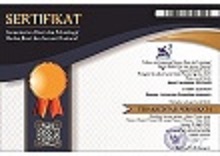Low-Emission Material Selection in “EDGE”-Based Green Building Design Practices: Evaluation of Recycled Terrazzo
Abstract
The construction sector is a major contributor to global carbon emissions, both from operational activities and the embodied carbon of building materials. One important component is floor covering material, where conventional materials such as ceramic, marble, and exposed concrete have a relatively high carbon footprint. This study focuses on evaluating the use of recycled terrazzo as a low-emission floor covering material in supporting the EDGE-based green building concept. This study aims to analyze the potential of recycled terrazzo compared to conventional materials such as ceramic, marble, and exposed concrete/cement in reducing embodied carbon values and reviewing its advantages and disadvantages from a technical aspect. The research method is a descriptive-comparative quantitative approach through EDGE software simulation and literature analysis to compare the performance of recycled terrazzo with conventional materials. The simulation results indicated that recycled terrazzo has the lowest embodied carbon value at 7.40 kgCO2e/m,2 savings 2.02% compared to ceramic, and significantly lower than marble which reaches 33.5 kgCO2e/m2. Exposed concrete/cement value at 8.90 kgCO2e/m2, which is still higher than terrazzo. From a technical aspect, recycled terrazzo excels in sustainability, aesthetics, and durability, although the installation process requires specialized expertise. The results of the study indicate that selecting recycled terrazzo as a flooring is effective in reducing carbon emissions while providing visual quality and durability that support green building strategies. This study emphasizes the importance of material selection from the early design stage as a concrete strategy in reducing environmental impacts and realizing green building aspects
Full Text:
PDFDOI: https://doi.org/10.17509/jaz.v8i3.90030
Refbacks
- There are currently no refbacks.
Copyright (c) 2025 Rifqah Raudhatul Firdausa, I Gede Oka Sindhu Pribadi

This work is licensed under a Creative Commons Attribution-ShareAlike 4.0 International License.






